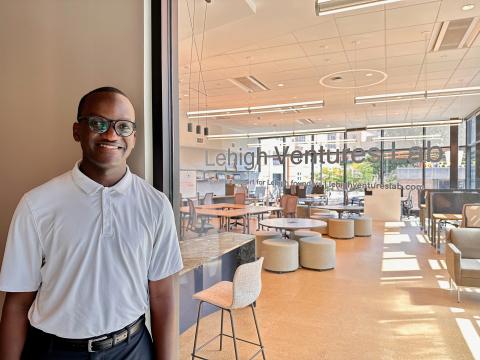Story by Jodi Duckett
Image by Sarah Barnett
Cedrique Wafula ’25 created Qlover to give back to unbanked farmers.
Cedrique Wafula ’25 was already busy running a logistics company in his native Kenya when he arrived at Lehigh with a desire to gain the skills and knowledge he felt he needed to be a bigger success and make a bigger difference back home.
He has achieved just that with Qlover, a fintech platform that provides bank-grade financing for small-scale farmers in Kenya, giving them an opportunity to make a better living.
“This was something I wanted to do to benefit individual farming communities,” says Wafula, a management major in the entrepreneurship and innovation track. “It’s very difficult for farmers to access finance and logistics support. They just need a bit of luck and support to improve their productivity and incomes.”
In May, Wafula won the Joan F. & John M. Thalheimer ’55 Eureka! Grand Prize at Lehigh’s annual Innovate! Celebrate! awards ceremony. The honor came with a $5,000 prize. Wafula has pitched a number of projects over the years in the Baker Institute’s Eureka! Student Venture program, earning money to fund his ventures and giving him access to coaching, mentorship and workspace.
Qlover’s name is inspired by the four-leaf clover, a symbol of luck for agricultural communities. The pilot program provides a case study for how the system works.
“We aggregated 500 farmers into a group and contracted with them to provide sorghum to East Africa’s largest brewery,” says Wafula. “I worked with a bank and structured financing so they could buy seeds and fertilizer and then harvest the produce. We collected the produce, paid the farmers for it, minus the finance cost, and then delivered the produce to the brewery. Our local partners got paid, the bank got paid and Qlover received the rest.”
Wafula says without his company, small farmers would have to sell their produce for a fraction of its value to middlemen, who would take it to market on their behalf. Or, farmers who wished to sell it themselves would get loans from middlemen at exorbitant interest rates.
Wafula’s goal is to continue improving Qlover’s technology and secure more financial partners.
“I grew up in a small farming town in Kenya, so I know how far an unbanked farmer would expect $5,000 to go in improving their productivity and livelihood,” he says. “I will hold Qlover to a similar standard as we use the funds to build out the tools lenders need to extend credit to smallholder farmer networks.”
Wafula plans to graduate in December. He says he needed an extra semester because he was juggling too many business projects when he started at Lehigh and his academics suffered.
“Lehigh has been great at teaching me about how to prioritize not just my entrepreneurial growth but my academic growth as well,” he says. “I’ve grown tremendously as an entrepreneur and as an individual. I have a much clearer sense of my strengths and weaknesses now.”
He adds: “My journey at Lehigh wouldn’t have been complete without support from the folks at the Baker Institute and Lehigh Ventures Lab, as well as the entrepreneurial community of students. How grateful I am for all the support through the years. I’m grateful for the tremendous successes, but also the knowledge I gained from the failures too.”


